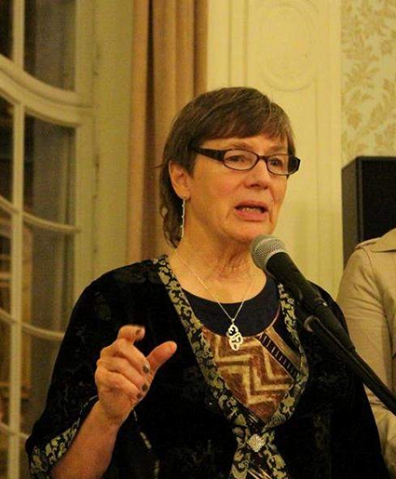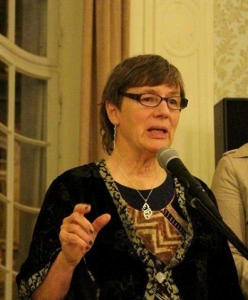Meet Lyn Coffin - Enraptured in Translation
Georgia Today interviews Lyn Coffin, the latest translator of Shota Rustaveli’s The Knight in the Panther’s Skin.
Shota Rustaveli’s immortal poem The Knight in the Panther’s Skin has recently been republished in English by famous American poet Lyn Coffin. The new translation is distinguished from the previous translations from its poetic form; Coffin used 16 syllable shires that added richness to the poem and it took almost three years for the translator to finish the work. As Coffin said in the following EXCLUSIVE interview with Georgia Today, while she expected the job to be tiresome, she soon became enraptured with the wisdom, music, characters and flow of the poem.
Coffin spent time teaching at the Ilia University as an assistant professor and holds a BA, MA and MSW from the University of Michigan, where she won Hopwood Awards for both short and long fiction. She also holds an MA in teaching from Columbia University and has taught at the University of Michigan and the University of Wisconsin. Coffin collaborated with Czesіaw Miіosz, Milan Kundera and Joseph Brodsky. Georgia Today met Lyn Coffin to discuss her latest translation.
Q: Ms Coffin, when did you get your first taste of Georgia?
A: I came to Georgia at the invitation of Gia Japaridze, a Brodsky scholar. He invited me to come and teach and to translate with him the anthology of Georgian poetry from Rustaveli to Galaktion. He told me we were to start with Rustaveli and I thought it would be very dull and boring. The twelfth century is not going to be interesting, I thought! Then he read it aloud to me and we began translating word by word. That was my first experience of Georgian poetry aside from the few small poems I’d previously translated by Ilia Chavchavazde that Gia sent me and I translated it through email.
I’ve translated a lot of Georgian poets- Dato Barbakadze, wonderful, fabulous poems by Nato Alkhazishvili, also Zaza Abzianidze, and Giorgi Kekelidze for Siesta Publication. I‘ve translated all the poems in the Anthology: Galaktioni, Vazha-Pshavela, and Rustaveli. Rustaveli’s translation in shire is a 16 syllables rhythm line. It was difficult at first but I got used to it.
Q: Which part did you like most?
A: I think the only part that is a little bit less interesting for me is the prologue as it’s somewhat static and in general I don’t like much talk about what I’m going to do. But there are parts in the Rustaveli prologue that are quite fascinating- literary criticism regarding what makes a good poet and also discussing Rustaveli’s love of Queen (King) Tamar and how difficult the situation would have been. But in general I enjoyed it from chapter one through to the end. I found the story of two strong women and two strong men extremely entertaining. Less interesting were the letters and testimonies of people like Avtandil and Nestan.
Q: You compare Rustaveli to Shakespeare, why?
A: Everything is in their writing! Whatever you want you can find: a good story, excellent metaphors, wisdoms expressed in proverbs, poetry, and the music itself expresses amazing psychological complexity. All this is in Shakespeare and Rustaveli both. The main thing was their ability to set the scene. Take the example of Macbeth. Shakespeare sets the scene, describes the castle, the flags flying, the wind, the birds in the sky, so you can see this castle; you feel you are there. In Rustaveli it’s the same thing when he describes King Rostevan’s court and Tinatin comes in. He describes what you are seeing and then he dives into the story.
Q: What are your plans regarding Georgia?
A: I’d like to be an ambassador to Georgia. Georgians are the most generous people on the planet, most sensitive to poetry, music and the arts. They’re fabulous people to get to know. I’d also like to make a movie or may be do a stage play. Georgia has wonderful films. I just came from the London Georgian Film Festival and I was very impressed by the level of films here. I love Tangerines, and In Blooms and Invisible Spaces; I saw all of them films in London.
Georgia Today asked famous Georgian writer Zurab Karumidze to comment on Lyn’s translation.
“Lyn Coffin comes from the famous Coffins of Nantucket (featured in Moby Dick), the famous whalers. Last year Lyn harpooned a poetic whale: translating Shota Rustaveli’s Knight in the Panther’s Skin, the Georgian national epic. Lyn Coffin is a very subtle person – she can receive an invitation from a butterfly landing on her palm, or transform an artichoke on her plate in a tiny restaurant in France into a flower and contemplate it. Like Yeats’s Crazy Jane she knows that Love is like the Lion’s tooth: ‘I dully thudded Out my life against your bones and body strand-was Cut, slit open by a most incisive blade.’ She can wear masks – Personae – and stay both blatant and frank at the same time. She’s good at keeping the balance between abstract and human. She’s a poet, and remains so in her prose: laconic, concise, impressionist.”
Meri Taliashvili











